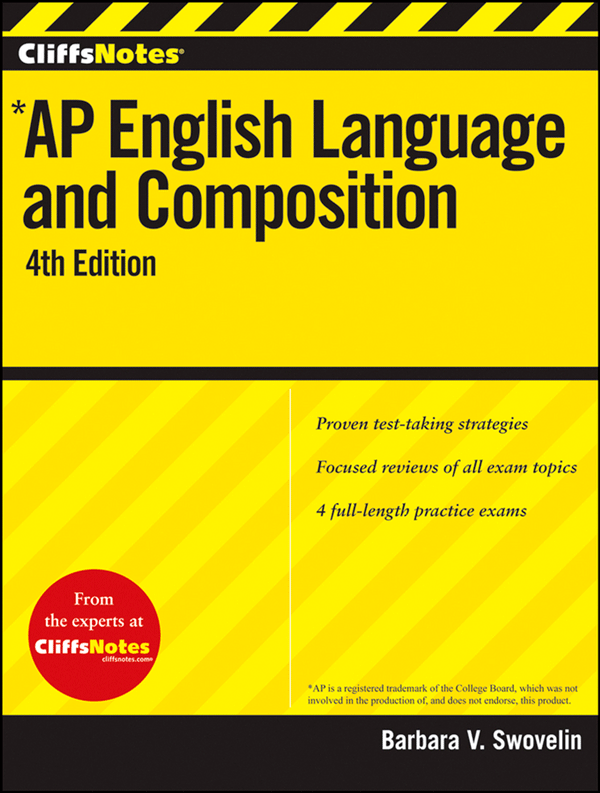Buy This CliffsNotes Book Here!

Each of the three AP English Language and Composition essays equals one-third of the total essay score, and the entire essay (free-response) section equals 55% of the total exam score.
Each essay is read by experienced, well-trained high school AP teachers or college professors. The essay is given a holistic score from 1 to 9. (A score of 0 is recorded for a student who writes completely off the topic-for example, "Why I think this test is a waste of money." A student who doesn't even attempt an essay, who leaves a blank page, will receive the equivalent of a 0 score, but it is noted as a dash [-] on the reader's scoring sheet.) The reader assigns a score based on the essay's merits as a whole, on what the essay does well; the readers don't simply count errors. Although each essay topic has its own scoring rubric (or guide) based on that topic's specific information, a general scoring guide for rhetorical analysis and argumentation essays follows. Notice that, on the whole, essay-scoring guides encompass four essential points; AP readers want your essay to be (1) on topic, (2) well organized, (3) thoroughly developed, and (4) correct in mechanics and sophisticated in style.
High Score (8-9)
High-scoring essays thoroughly address all the tasks of the essay prompt in well-organized responses. The writing demonstrates stylistic sophistication and control over the elements of effective writing, although it is not necessarily faultless. Overall, high-scoring essays present thoroughly developed, intelligent ideas; sound and logical organization; strong evidence; and articulate diction.
-
Rhetorical analysis essays demonstrate significant understanding of the passage, its intent, and the rhetorical strategies the author employs.
-
Argument essays demonstrate the ability to construct a compelling argument, observing the author's underlying assumptions, (addressing multiple authors in the synthesis essay) and discussing many sides of the issues with appropriate evidence.
Medium-High Score (6-7)
Medium-scoring essays complete the tasks of the essay topic well - they show some insight but usually with less precision and clarity than high-scoring essays. There may be lapses in correct diction or sophisticated language, but the essay is generally well written.
-
Rhetorical analysis essays demonstrate sufficient examination of the author's point and the rhetorical strategies he uses to enhance the central idea.
-
Argument essays demonstrate the ability to construct an adequate argument, understand the author's point, and discuss its implications with suitable evidence. The synthesis argument will address at least three of the sources.
Medium Score (5)
Essays that earn a medium score complete the essay task, but with no special insights; the analysis lacks depth and merely states the obvious. Frequently, the ideas are predictable and the paragraph development weak. Although the writing conveys the writer's ideas, they are presented simplistically and often contain lapses in diction or syntax.
-
Rhetorical analysis essays demonstrate uneven or insufficient understanding of how rhetorical strategies create an author's point. Often, the writer merely lists what he or she observes in the passage instead of analyzing effect.
-
Argument essays demonstrate the ability to present an argument, but they frequently provide limited and inadequate discussion, explanation, or evidence for the writer's ideas. The writer may not address enough of the sources in the synthesis essay. Oversimplification of the issue(s) minimizes the essay's effectiveness.
Medium-Low Score (3-4)
These essays are weaker than the 5 score because the writer overlooks or perhaps misreads important ideas in the passage. The student may summarize the passage's ideas instead of analyzing them. Although the writer's ideas are generally understandable, the control of language is often immature.
-
Rhetorical analysis essays demonstrate little discussion of rhetorical strategies or incorrect identification and/or analysis of those strategies.
-
Argument essays demonstrate little ability to construct an argument. They may not clearly identify the author's point, may not present multiple authors' points of view in the synthesis essay, and may offer little evidence for the student's position.
Low Score (1-2)
These essays demonstrate minimal understanding of the topic or the passage. Perhaps unfinished, these essays offer no analysis of the passage and little or no evidence for the student's ideas. Incorrect assertions may be made about the passage. Stylistically, these essays may show consistent grammatical problems, and sentence structure is usually simple and unimaginative.
-
Rhetorical analysis essays demonstrate little ability to identify or analyze rhetorical strategies. Sometimes these essays misread the prompt and replace it with easier tasks, such as paraphrasing the passage or listing some strategies the author uses.
-
Argument essays demonstrate little ability to understand the author's point (or multiple authors in the synthesis essay) and then construct an argument that analyzes it. Minimal or nonexistent evidence hurts the essay's effectiveness. Some students may substitute an easier task by presenting tangential or irrelevant ideas, evidence, or explanation.